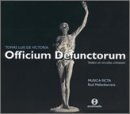| All Artists: Tomas Luis de Victoria, Musica Ficta Title: Tomás Luis de Victoria: Officium Defunctorium Members Wishing: 0 Total Copies: 0 Label: Enchiriadis Release Date: 3/25/2003 Genre: Classical Styles: Opera & Classical Vocal, Historical Periods, Early Music Number of Discs: 1 SwapaCD Credits: 1 UPC: 675754597221 |
Search - Tomas Luis de Victoria, Musica Ficta :: Tomás Luis de Victoria: Officium Defunctorium
 | Tomas Luis de Victoria, Musica Ficta Tomás Luis de Victoria: Officium Defunctorium Genre: Classical
|
Larger Image |
CD Details |
CD ReviewsMoving performance of Victoria's final masterpiece is a wort Eddie Konczal | 07/22/2006 (4 out of 5 stars) "Tomas Luis de Victoria was the last, and arguably the greatest, in a line of Spanish composers of the Renaissance. Following his predecessors Morales and Guerrero, Victoria elevated the "learned style" of counterpoint pioneered by mid-Renaissance Franco-Flemish composers to new heights. His Requiem Mass, "Officium Defunctorum," dates from 1605 and thus represents one of the last great works of high Renaissance polyphony. Victoria composed this Requiem Mass to commemorate the death of the Dowager Empress Maria, whom he served for 16 years as chaplain.
Victoria worked under strict Church rules governing sacred polyphony. In the 16th Century, polyphony was nearly banned for obscuring sacred texts. Palestrina's "Missa Papae Marcelli" allegedly "saved" polyphony, but arguably simplified the genre in response to demands for simpler harmonies. With "Officium Defunctorum," Victoria managed to remain within the new rules while surpassing the static beauty of Palestrina's style. Victoria's voices move more quickly than Palestrina's, allowing him to achieve a greater range of expressiveness through harmonic motion. Another hallmark of Victoria's style is frequent and evocative use of suspensions, which create tension and heighten emotion. The Spanish ensemble Music Ficta delivers a moving performance of "Officium Defunctorum," also performing the motet "Vadam et circuibo civitatem." The ensemble consists of both male and female voices, accompanied tastefully by organ and dulcian (a predecessor of the bassoon). This is dreamlike polyphony, conveying an incredible feeling of repose and peace. The natural echoes of the cathedral establish authenticity and gravitas, though perhaps at the expense of intimacy. The recording level is on the low side; you'll need to turn this one up to better experience it. The performance rewards both active and passive listening: you can study it as these scholars did, looking to discover something new with each listening, or sit back and let the gentle strains of Victoria's polyphony bring you to a peaceful state. "Officium Defunctorum" was the last composition of Victoria's illustrious career. Music Ficta has vividly brought this 400-year-old Requiem Mass to life; their performance is a worthy addition to any early music collection." |

 Track Listings (11) - Disc #1
Track Listings (11) - Disc #1